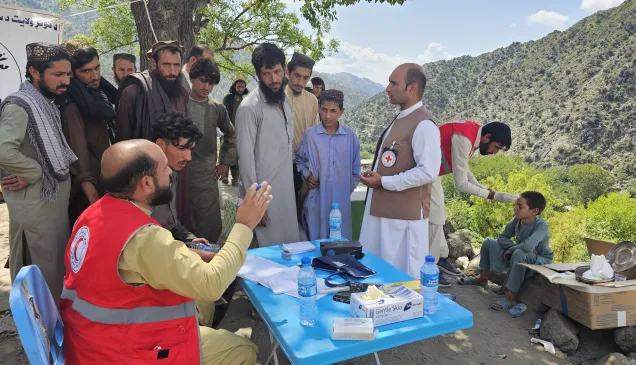Afghanistan: Wheelchair basketball empowers people with disability
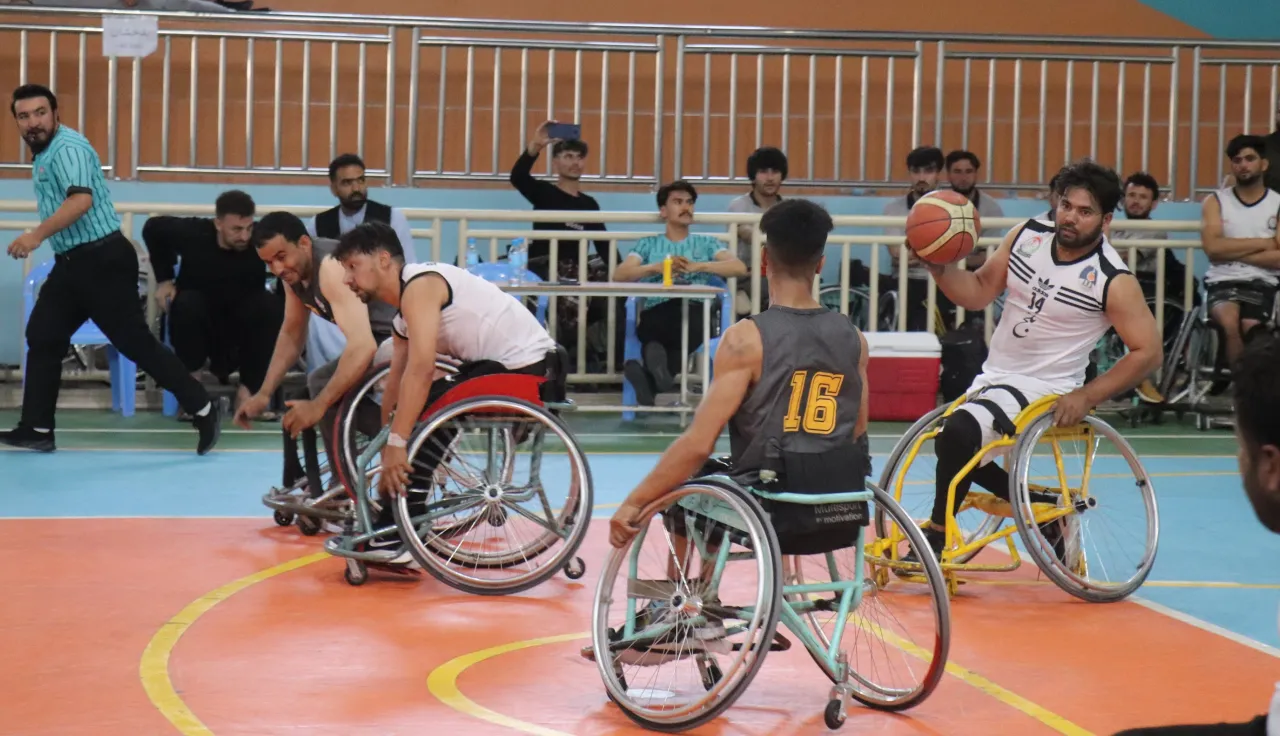
The vibrant energy of Afghanistan's top six wheelchair basketball teams – Kabul, Mazar, Faizabad, Parwan, Herat, and Jalalabad – gathered for the Afghanistan National Wheelchair Basketball Tournament, in Herat, from 21 to 25 June 2024. These Group A powerhouses clashed in a display of skill and determination.
Let's get to know some of the talented players who have made it to this event. Learn about their journeys, their motivations, and what drives them to be part of the wheelchair basketball teams.
Meet Sebghatullah Qarizadah, a 28-year-old wheelchair basketball player from Herat, Afghanistan. Contracting polio at just three years old, Sebghatullah's early life was marked by adversity and challenges. His father's passing when he was only five left him as the primary breadwinner for his family. Undeterred and young, he worked tirelessly while pursuing his education.
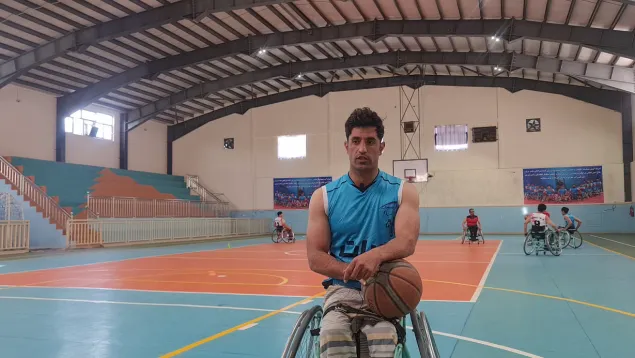
Sebghatuallah, wearing Herat's blue jersey, has been working as a physiotherapist for the past two years at the ICRC’s physical rehabilitation centre in Herat, Afghanistan.
Sebghatullah's determination led him to the ICRC's vocational training programme, where he discovered a new path forward. With the ICRC's support, he completed his higher education in physiotherapy and his childhood passion for sports never faded, and he set his sights on becoming a professional athlete.
A chance encounter at the gymnasium sparked a motivation within him. A relative, upon learning he was there to play wheelchair basketball, scoffed that sports were not for people with disabilities. Sebghatullah seized on this moment, channeling the doubts of others into fuel for his journey. "Since then," he says, "I have played with even more enthusiasm."
For Sebghatullah and others, wheelchair basketball is more than a game – it's a platform for empowerment. It fosters autonomy and shatters preconceived notions about what those with disabilities can achieve. Through every dribble, pass, and shot, players like Sebghatullah are redefining boundaries and inspiring others.
The ICRC's wheelchair basketball program has grown to support an impressive 719 players across 13 provinces. Selection for this transformative program is conducted in accordance with the International Wheelchair Basketball Federation's – IWBF criteria, ensuring a safe and inclusive environment for all. Prospective athletes must meet specific requirements around eligible disabilities, minimum age, and physical and mental well-being. For minors, the permission of their families is also essential.
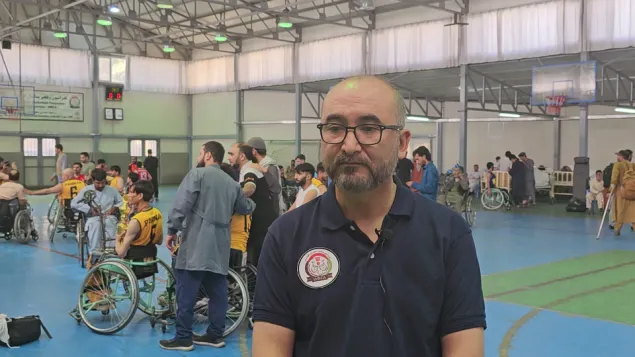
Shukrullah Zeerak, the manager of the ICRC’s wheelchair basketball program.
At the helm of the initiative is Shukrullah Zeerak, the 47-year-old manager who is dedicated to empowering people with disabilities. “The players are mainly recruited by physiotherapists during physical rehabilitation sessions or by social workers. Young people with disabilities are informed about sports activities during their treatment at the ICRC’s physical rehabilitation centres and 44 of the 719 players are recruited by the ICRC,” he says.
Zeerak explains the importance of sports in promoting the physical and mental well-being of people with disabilities. “Participating in these activities helps to reveal their capacity, boosts their self-esteem and promotes their social integration,” he says.
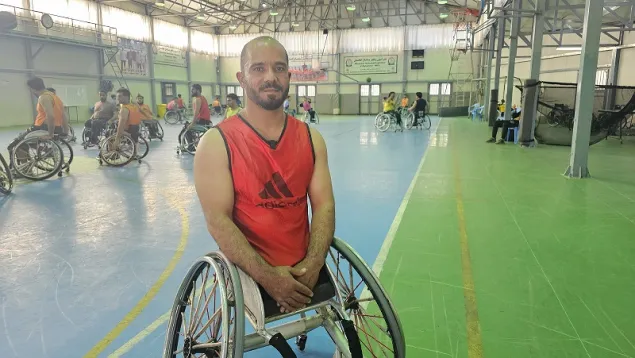
Saber 34 is also working at the ICRC’s PRC since 2013 assisting many other people with disabilities.
Mohammad Saber Sultani, 34, has been a driving force for Kabul’s wheelchair basketball team for over a decade. His journey to the court began in tragedy as he lost both his legs when an unexploded ordnance blew up. He was only three years old at the time. Sultani says he couldn’t help but feel deep disappointment as he grew up watching others walk and live normal lives.
But that outlook on life shifted when a friend introduced him to the ICRC’s wheelchair basketball programme. “Seeing players with even greater disabilities than mine, I realized if they could do it, I could too.
"From the time I started playing wheelchair basketball, I have forgotten about my disability," Saber reflects. The sport became his equalizer, a field where he wasn't defined by his physical limitations. His talent and tenacity quickly shone through – he surpassed his own expectations, earning a spot on the national team and traveling abroad to compete in international tournaments.
Saber's success has brought more than personal triumph. He and his team have claimed two titles in tournaments in Lebanon and excellent placements in other international competitions, return home to joy, and bask in the pride of his family, friends, and community. His achievements have earned their respect and admiration, shifting how those around him perceive ability and disability.
Decades of conflict and gaps in development have left an enduring mark on Afghanistan where over one million people live with some form of physical disability. Since 1988, the ICRC has been at the forefront of supporting affected people through its Physical Rehabilitation Programme (PRP). The programme helps over 200,000 people every year through seven physical rehabilitation centres across the country.
We began supporting wheelchair basketball teams in 2012 and now provide technical and financial support. From covering taxi fares so that players can attend practice to supplying specially-adapted wheelchairs to maintaining courts and providing access to good trainers, every detail is considered so that talent can be nurtured.
The sports activities have transformed the lives of many wheelchair basketball players and the ICRC remains committed to its mission to support people with disability, celebrate their achievements, and create a future where they regardless of their disability, can thrive.


